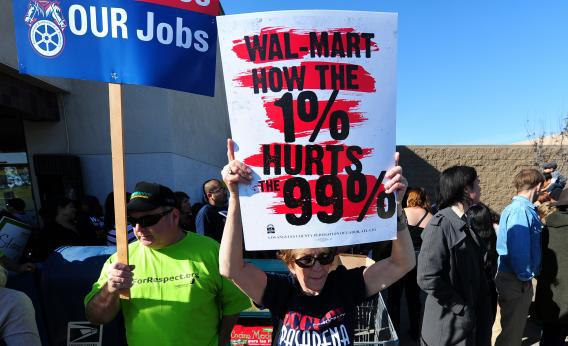I find a lot of anti-Wal-Mart writing unpersuasive, but far and away the strongest case that Wal-Mart’s workers could improve their lives at no cost to the public weal if they had a strong labor union comes from pro-Wal-Mart voices.
Here’s Megan McArdle for example:
Recessions are also a time when employers don’t necessarily have a lot of profits to give up. Walmart’s $446 billion of revenue last year was eye-popping, but its profit margins are far from fat–between 3% to 3.5%. If they cut that down by a percentage point–about what retailers like Costco and Macy’s have been bringing in–that would give each Walmart employee about $2850 a year, which is substantial but far from life-changing. Further wage improvements would have to come out of the pockets of Walmart’s extremely price conscious shoppers. Which might be difficult, given how many product categories Amazon is pushing into.
This is a great case study in rhetorical strategies. But the analysis is admirably clear. Wal-Mart’s profit margins, though by no means enormous, are larger than those of its main competitors. Given the weak national labor market, Wal-Mart has no reason to cough up extra money to its workforce. But a strong labor union could coerce them into coughing up higher pay and bringing their margins in line with Costco and Macy’s. As a result, each Wal-Mart employee might get a bit less than $3,000 more a year. Whether that’s “life-changing” or not is an interesting question, but since we’re talking about low-wage workers here, I think the intuitions of highly paid professionals may be a bit off. It seems very plausible that the marginal hedonic value of a thousand bucks or three to Wal-Mart’s workforce would be very large.
I’m reminded of “Seven and a Half Cents” from what’s far and away the best musical comedy about union organizing:
Jason Furman has argued persuasively in my view that Wal-Mart’s low prices are an underappreciated boon to the American working class, but McArdle’s point about profit margins underscores the fact that a stronger worker presence would likely create wage gains without undermining Wal-Mart’s low prices.
Now the Amazon point is a crucial one for the medium term. Competitors should be pissing their pants about Amazon and its sell-at-a-loss-and-make-it-up-in-volume business strategy. No amount of squeezing your workers is going to let you maintain your margins in the face of competition from an entrant who has no margins. This behemoth will devour Walm-Mart—associates and executives alike—unless Wall Street stops offering it such a generous price/earnings ratio.
